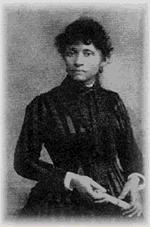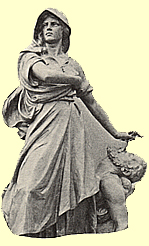

 "We thought we were being tried for murder. We found out afterwards we were being tried for Anarchy" —Samuel Fielden
"We thought we were being tried for murder. We found out afterwards we were being tried for Anarchy" —Samuel Fielden
On May 4, 1886 a town meeting was called in Chicago's Haymarket Square by anarchists and labor activists. As the peaceful assembly came to a close, 180 police officers stormed the meeting, demanding it disburse. Suddenly an unknown assailant threw a bomb into the crowd killing a police officer and injuring several others. The police responded instantly by shooting and clubbing wildly into the crowd, killing 7 other fellow police officers, injuring 60 more and killing and injuring an unknown number of civillians at the meeting. This event, and the episode that followed in its wake, known as the Haymarket affair, the Haymarket massacre or the Haymarket tragedy, is the single historic event for which Lucy Parsons is best remembered. Although it was only part of Lucy's long and tireless activist legacy, the Haymarket affair drew international attention to the American anarchist movement and became a historic landmark in anarchist and labor history. The Haymarket affair grew out of the campaign for the 8 hour workday. Lucy Parsons, her husband, Albert Parsons, and many other labor radicals were already well known in Chicago and across the United States, and had been actively organizing with the militant labor movement. On May 1st, 1886, a series of massive strikes were called and hundreds of thousands of workers poured out of the factories demanding shorter working hours. Lucy and Albert Parsons alone led 80,000 workers up Michigan Avenue. By May 3rd a lockout had occurred by employers at McCormick Harvester Works in Chicago. 1,500 employees were protesting the lockout when scabs arrived and a small skirmish started between scabs and workers. 200 police arrived in response, shooting at protesters leaving 4 workers dead and many more wounded. The following night, May 4, the Haymarket Square meeting was called to address the police violence and the continuing labor struggles. It was at this meeting that the police arrived and the bomb thrown. Following the bomb at Haymarket the police responded the next day by rounding up several of the city's leading anarchist labor activists, including Lucy Parsons and several of their associates, despite a lack of evidence for their involvement —most were not even there when it occurred. Albert went into hiding, but eventually turned himself in. Lucy was jailed several more times and eventually released, but Albert, and 7 other anarchists were eventually sentenced, not for the bombing, but for their beliefs in anarchism. "Let the voice of the people be heard!" —Albert Parsons (his final words before being executed). The trial began in June 1886 and was marked by considerable bias and anti-anarchist sentiment. The prosecution aimed to make an example of the defendants, portraying them as dangerous radicals threatening the social order. Throughout the trial, the defendants argued that their beliefs in anarchism and labor rights were being criminalized. While none of the martyrs were found guilty of throwing the bomb into Haymaket Square, all of them had spent years openly advocating for the use of dynamite as a weapon of class war. This made them easy targets to point to as the agitators of the incident, and was ultimately their undoing. Lucy went on a national tour gathering support for her husband and comrades in jail, raising funds for their legal defense and delivering powerful speeches and reaching hundreds of thousands of people within a couple of months, but it was not enough. In the end, one of the anarchists, Louis Lingg killed himself in prison, refusing to give the state the satisfaction of executing him. Two others, Michael Schwab and Samuel Fielden, were sentenced to life in prison, while Oscar Neebe got 15 years. The other four, Albert Parsons, August Spies, Adolph Fischer, and George Engel were hung on November 11, 1887. Six years later, Michael Schwab, Samuel Fielden, and Oscar Neebe were pardoned, a recognition of the injustice of the trial. "The day will come when our silence will be more powerful than the voices you strangle today." —August Spies Following the sentencing of the Haymarket Eight, Lucy continued to vigorously agitate inside and outside of the United States on behalf of Albert and the other martyred comrades. She delivered lectures constantly wherever she traveled and sold thousands of copies of Famous Speeches from the Haymarket martyrs' trial. She also widely distributed Albert Parsons's book Anarchism, and Life of Albert R. Parsons, which she helped to edit. Word spread of the Haymarket affair and soon it had become international in scope, reaching and inspiring untold numbers of activists. Primarily as a result of Lucy's tireless efforts, the Haymarket martyrs became historic inspirations, spawning a wave of anarchists and radical labor agitators worldwide. Emma Goldman, Voltairine de Cleyre, Alexander Berkman, Enrique Flores Magón, Helen Keller, Eugene V. Debs and many other famous radicals were moved, inspired and drawn to anarchist, socialist and anti-capitalist union organizing as a result of the Haymarket events. Goldman considered it to be "the most decisive influence in my existence." Labor activists the world over dedicated May 1st (May Day) on behalf of the Haymarket martyrs and the struggle for the 8-hour work day. And scores of other radical labor activists and union organizers, including the Industrial Workers of the World, were inspired and moved to action by the tragedies of 1886. The Haymarket affair is one of the most important episodes in US labor and anarchist history. The Haymarket affair has been documented in several books including: The Haymarket Tragedy by Paul Avrich (1984), Haymarket Scrapbook edited by Dave Roediger and Franklin Rosemont (1986), and Death in the Haymarket by James Green (2006).
More Information About The Haymarket Affair: Haymarket Incident By Dave Roediger The Bomb at Haymarket By Sidney Lens Women in the Haymarket Event By Carolyn Ashbaugh Statements of the Accused: The Haymarket Martyrs Radical Women: The Haymarket Tradition By Carolyn Ashbaugh 1886, May 4: The Haymarket Tragedy Chicago Public Library Haymarket Widows By Carolyn Ashbaugh The Voice of the People will yet be Heard By Lucy Parsons Profile In Courage: John Peter Altgeld & The Haymarket Pardons By Robert Tabscott The Haymarket Martyrs' Monument as a Labor Icon By Robin Bachin Strange Legacies: The Black International & Black America By Dave Roediger The Haymarket Meeting By Lucy Parsons The Eleventh of November, 1887 By Lucy Parsons Related Articles: May Day By Scott Molloy In November We Remember By Franklin Rosemont Knights of Labor in the Haymarket Era By Richard Schneirov International Working People's Association By Alan Dawley Albert Parsons By Dave Roediger Lizzie Holmes By Blaine McKinley What is Anarchism? By Albert R. Parsons Other Resources: The Famous Speeches of the Eight Chicago Anarchists in Court The Pinkertons Have a Long, Dark History of Targeting Workers By Kim Kelly |